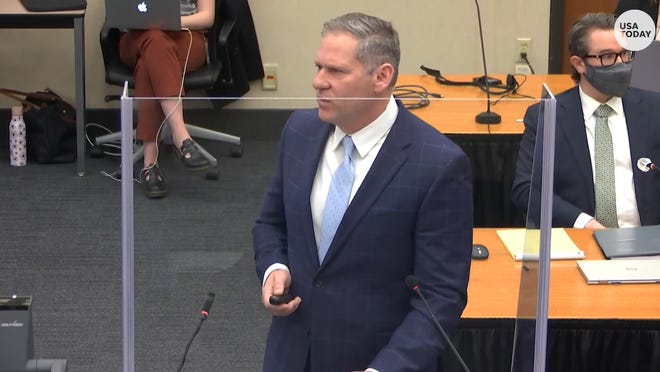The long and winding divorce of Angelina Jolie and Brad Pitt was thrown into further delay Friday after a California appeals court handed Jolie a major victory by disqualifying the private judge the couple used to handle the split and their contentious custody dispute.
The 2nd District Court of Appeal agreed with Jolie that Judge John Ouderkirk didn't sufficiently disclose in a timely manner business relationships with Pitt's attorneys, thus raising potential questions about his impartiality.
“Judge Ouderkirk’s ethical breach, considered together with the information disclosed concerning his recent professional relationships with Pitt’s counsel, might cause an objective person, aware of all the facts, reasonably to entertain a doubt as to the judge’s ability to be impartial. Disqualification is required,” the court ruled.
The decision means that the custody fight over the couple's five minor children, which was nearing an end, could be starting over with a new judge. The couple have six children but the eldest, Maddox, is 19.
Their other children are Pax, 17, Zahara, 16, Shiloh, 15, and twins Vivienne and Knox, 12.
How we got here:Jolie and Pitt's lawyers face off over her bid to dump their private judge in divorce case

What happens to custody in the Angelina Jolie/Brad Pitt divorce?
The judge already ruled the pair divorced, but separated the child custody issues.
What happens next likely depends on Pitt, according to San Francisco Bay Area divorce lawyer Brent Kaspar. The two sides either have to agree on a new private judge to hear the custody matter or Pitt's lawyers will have to take his case to a public judge in family court in Los Angeles.
"They pick another private judge and they go back to square one – it's a reset back to what custody was prior to (Ouderkirk's) order," Kaspar told USA TODAY. If Jolie declines to agree to a new judge, "Pitt's recourse is to go to Superior Court, to a family law court judge and file a motion to modify custody."
Either way, a final resolution is further delayed, thus possibly allowing at least some of the older kids to age out.
Why did they hire a private judge?
Like many celebrity couples, Pitt and Jolie opted to hire their own judge to increase their privacy in the divorce proceedings, which began more than four years ago. Ouderkirk was the judge both picked to marry them in 2014.
Ouderkirk declined to disqualify himself when Jolie asked him to in a filing in August. A lower court judge ruled that Jolie’s request for disqualification came too late. Jolie’s attorneys then appealed.
The July 9 oral arguments in front of the appeals court focused on whether Ouderkirk had followed ethical rules strictly enough by revealing new business dealings in a timely manner. Private judges in California are usually retired superior court judges who often have professional links to lawyers in the county.
Pitt's lawyer, Ted Boutrous, insisted that Jolie's objection to the judge amounted to "game-playing." He described Jolie as "a sophisticated person with sophisticated lawyers," who had known all along about matters requiring disclosure by Ouderkirk but did not raise objections until she began losing in his court.
“If you’re going to play the role of a paid private judge you have to play by the rules and the rules are very clear, they require full transparency,” Jolie's attorney Robert Olson said at the hearing. “Matters that should have been disclosed were not disclosed...If rules have no consequences they are empty."
The panel questioned whether such private judges should be allowed in California at all, but their ruling applies only to Ouderkirk.
“The perception of bias (in the courts) is the real concern here," Kaspar said. "The judicial system doesn’t work if the public doesn’t trust the fact-finders, and this applies to both public and private judges. The appellate court wants to protect the public’s view of all judges by ensuring they are making these crucial disclosures.”
'The facts haven't changed,' says rep for Brad Pitt
USA TODAY reached out to Pitt's lawyer, Boutrous, and Jolie's lawyer, Olson, for comment but did not get an immediate response.
A representative for Pitt issued a statement to USA TODAY saying the ruling was based on a procedural issue but the facts of the case have not changed.
"There is an extraordinary amount of factual evidence which led the judge and the many experts who testified to reach their clear conclusion about what is in the children’s best interests," the statement read. "We will continue to do what’s necessary legally based on the detailed findings of what’s best for the children.”
USA TODAY also reached out to a representative for Jolie.
Jolie, 46, and Pitt, 57, were among Hollywood’s most prominent couples for 12 years. They had been married for two years when Jolie filed for divorce in 2016.
Ouderkirk declared them divorced in April 2019, after their lawyers asked for a judgment that allowed a married couple to be declared single while other issues remained, including finances and child custody.
In May, Jolie and her attorneys criticized Ouderkirk for not allowing the couple's children to testify in the custody proceedings.
The actress also said the judge “has failed to adequately consider” a section of the California courts code, which says it is detrimental to the best interest of the child if custody is awarded to a person with a history of domestic violence.
Her filing did not give details about what it was referring to, but her lawyers submitted a document under seal in March that purportedly offers additional information.
In November 2016, after an anonymous complaint was filed with the Los Angeles County Department of Children and Family Services, the agency decided that Pitt did not commit child abuse during a family dispute on a private plane as they traveled back from France to the U.S. in September.
The ruling does not address whether the children should be allowed to testify in the custody case in the future.
Contributing: The Associated Press
Source link









